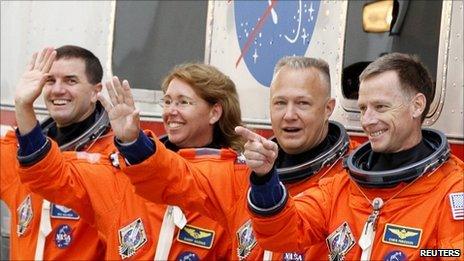Space shuttle Atlantis in historic final lift-off
- Published
Atlantis launches from Cape Kennedy
The 135th and final space shuttle mission has lifted off from Cape Canaveral in Florida.
Space shuttle Atlantis was launched into history at 1129 local time (1529 GMT; 1629 BST) on Friday.
The 12-day mission will ferry 3.5 tonnes of supplies to the International Space Station.
Upon its return, the 30-year space shuttle programme will come to a close, with Atlantis and the other two shuttles retired to museums.
For much of the week, a launch had been thought highly unlikely.
The weather on Thursday had thrown torrential rain at the orbiter, and forecasters had been talking grimly of similar conditions developing on Friday.
The final flight
-
135 missions 33 for Atlantis
-
355 astronauts taken into space since 1981
-
The fleet has flown well over 870 000 000 km
-
The shuttle and its boosters have 2.5 million moving parts
- Figures assume Atlantis completes mission
But the promised showers never materialised and controllers in the "firing room" gave the "go" for the ascent after a positive poll from their ground teams.
Launch director Mike Leinbach told the Atlantis crew - Chris Ferguson, Doug Hurley, Sandy Magnus and Rex Walheim - to "have a little fun up there" with "a true American icon".
Leinbach's call prompted a huge cheer from the thousands of guests inside the Kennedy Space Center and a rush to grab the best viewing positions.
Many lined the tops of buildings around KSC; others went down by the famous countdown clock on the lawn in front of the press complex.
For a few moments, it seemed there might be a cruel disappointment when the count was suddenly stopped at 31 seconds to check equipment on the launch pad would not obstruct a clean get away by the orbiter. But once a safe situation was established, the count picked up again and Atlantis soon raced skyward.
The spectators inside KSC, and the hundreds of thousands more people outside the centre, did not see the orbiter's climb for long.
Within a minute she had disappeared through a bank of cloud for the chase out over the Atlantic and a rendezvous with the International Space Station (ISS) on Sunday.
The ship and her crew will spend seven days docked at the orbiting platform.
Food truck
Mission goals include the delivery of a huge load of food for the ISS residents and a robotics facility that will test strategies for re-fuelling satellites high above the planet.
There has been much talk here in the past few days about the end of an era and the consequences it will have for the Kennedy workforce, many of whom will lose their jobs.
Nasa has attempted to shift the debate to what comes next and the strategy it has adopted to replace the expensive orbiter programme.
"The future of human spaceflight is bright," Administrator Charles Bolden insisted to reporters. "You'll hear me say that over and over and over again, so you need to print it."
His agency believes a more affordable approach to getting astronauts to the ISS can be achieved by contracting out their transport to private companies.
One of those prospective commercial concerns, Boeing, has been displaying a model at KSC of a capsule it says could lift up to seven individuals to the station.
Another, the Sierra Nevada Corporation, signed an agreement with Nasa on Thursday to use Kennedy's facilities.

The four astronauts will help take supplies to the International Space Station
SNC is producing a mini-shuttle it calls the Dream Chaser, which, again, could carry up to seven astronauts into low-Earth orbit.
But none of the commercial replacements for shuttle are likely to be ready for service for at least three years.
Nasa itself hopes to invest in a new spaceship and rocket that can take humans beyond the space station to destinations such as the Moon, asteroids and Mars.
The conical ship, known as Orion, has already been defined and is in an advanced stage of development. The rocket, on the other hand, is still an unknown quantity.
The US Congress has told the agency what its minimum capabilities should be. However, the agency is currently struggling to put those specifications into a concept it says can be built to the timeline and budget specified by the politicians. It promises to detail the rocket's baseline design before the summer is out.
Critics have bemoaned the lack of speed in moving to new systems, a delay that means America must rely on Russian rockets to launch its astronauts for the foreseeable future.
Asked here why he thought Nasa did not have a ready-made replacement for the shuttle, Bill Nelson, a US Senator and leading figure in the space debate on Capitol Hill, said: "Because Nasa has been starved of funds these past six to eight years."
US President Barack Obama has proposed the agency's budget be frozen right through to the Fiscal Year 2016. The House of Representatives appropriations panel has suggested it be cut.
Jonathan.Amos-INTERNET@bbc.co.uk | More from Jonathan, external